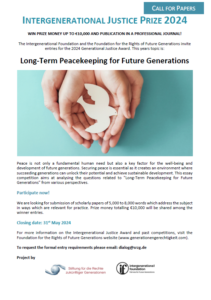Intergenerational Justice Prize 2024
The Foundation for the Rights of Future Generations (FRFG) and the Intergenerational Foundation (IF) jointly promote: the Intergenerational Justice Prize. The prize is awarded biennially. A total of €10,000 – generously endowed by the Stiftung Apfelbaum – is awarded each year and divided among the winning entrants.
The Intergenerational Justice Prize 2024 deals with the subject
“Long-term Peacekeeping for Future Generations”
The deadline for submitting papers expires 31 May 2024.
Peace is not only a fundamental human need but also a key factor for the well-being and development of future generations. Securing peace is essential as it creates an environment where succeeding generations can unlock their potential and achieve sustainable development. Wars and violent conflicts have devastating consequences for society. They result in loss of life and health, destroy communities and infrastructure, disrupt education and social progress, and often leave long-lasting trauma.
 The possession of nuclear weapons gives humanity, for the first time in history, the means to bring about its own extinction. The war in Ukraine and the growing tensions around Taiwan have made the use of nuclear weapons more likely than ever before. Humanity cannot afford to rely on nuclear deterrence; the current approach to nuclear weapons is not sustainable. The use of all types of nuclear weapons leads to the immediate destruction of human lives and infrastructure. Apart from that, it also leads to long-term consequences for the environment. In addition, the maintenance and modernization of nuclear arsenals require significant financial resources. These resources could instead be invested in areas such as education, healthcare, poverty alleviation, and the fight against climate change to meet the needs of present and future generations.
The possession of nuclear weapons gives humanity, for the first time in history, the means to bring about its own extinction. The war in Ukraine and the growing tensions around Taiwan have made the use of nuclear weapons more likely than ever before. Humanity cannot afford to rely on nuclear deterrence; the current approach to nuclear weapons is not sustainable. The use of all types of nuclear weapons leads to the immediate destruction of human lives and infrastructure. Apart from that, it also leads to long-term consequences for the environment. In addition, the maintenance and modernization of nuclear arsenals require significant financial resources. These resources could instead be invested in areas such as education, healthcare, poverty alleviation, and the fight against climate change to meet the needs of present and future generations.
Securing long-term peace requires actions at individual, national, and international levels. It demands building trust and promoting dialogue among nations, cooperating in conflict prevention and resolution, strengthening institutions for peace and justice, promoting human rights, and pursuing sustainable development.
We hereby ask for contributions that consider and analyse the topic from different perspectives. In order to receive the complete submission requirements (formal requirements and an official registration form) for those who are interested, please contact us via e‑mail at dialog@srzg.de with the subject „Intergenerational Justice Prize 2024“. The best entries will be considered for publication in the next issue of The Intergenerational Justice Review.
The members of the expert panel are:
— Dr. Mathew George: Director of the Stockholm International Peace Research Institute (SIPRI) Arms Transfers Programme
— Prof. Dr. Gerald Kirchner: Director of the Carl Friedrich von Weizsäcker Center for Science (ZNF)
— Prof. Dr. Dr. Christian Reuter: Department of Computer Science, TU Darmstadt, PEASEC – Science and Technology for Peace and Security
— Prof. Dr. Conrad Schetter: Director of the Bonn International Centre for Conflict Studies (BICC)
— Prof. Dr. Michal Smetana: Institute of International Studies at Charles University (Prague), Director of the Peace Research Center Prague
— Elena K. Sokova: Executive Director of the Vienna Center for Disarmament and Non-Proliferation (VCDNP)
— Prof. Brian Toon: Department of Atmospheric and Oceanic Sciences and Research Scientist at the LASP of the University of Colorado
— Prof. Dr. Herbert Wulf: Senior Fellow at BIIC and Senior Associate Fellow Institute for Development and Peace (INEF)
For further details on past prizes take a look into our Awards Archive.


